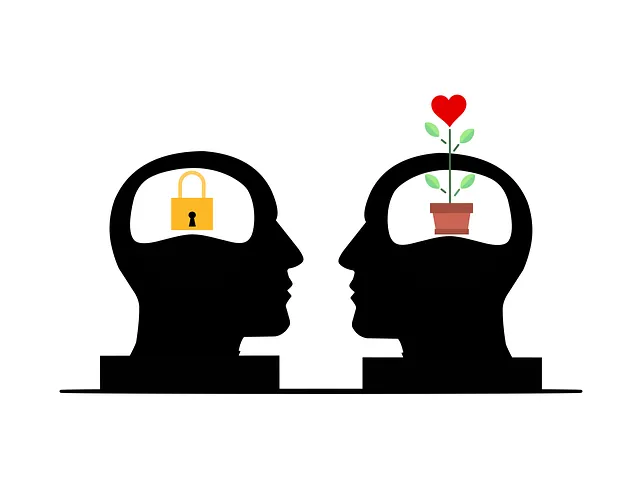The Kaiser Permanente Mental Health Access Center Englewood prioritizes emotional intelligence (EQ) for individual and collective well-being. Through tailored self-awareness exercises, holistic programs, and mental health education, the center equips individuals with stress management, communication, and empathy skills. By fostering a supportive environment, they promote personal growth, resilience, and stronger relationships within the community, benefiting both personal and professional settings.
Emotional intelligence (EQ) is a powerful tool for personal and professional growth, as demonstrated by the success stories at the Kaiser Permanente Mental Health Access Center Englewood. This article explores the transformative potential of EQ through various lenses. We’ll delve into its core components, including self-awareness and empathy, and provide practical strategies to enhance your emotional intelligence. By understanding and cultivating EQ, you can significantly improve relationships and navigate life’s challenges more effectively.
- Understanding Emotional Intelligence: Unlocking Potential at Kaiser Permanente Mental Health Access Center Englewood
- The Impact of EQ on Personal and Professional Success
- Strategies for Enhancing Self-Awareness: A Key Pillar of Emotional Intelligence
- Developing Empathy: Connecting with Others on a Deeper Level
- Practical Tools for Better Communication: Navigating Relationships with Emotional Intelligence
Understanding Emotional Intelligence: Unlocking Potential at Kaiser Permanente Mental Health Access Center Englewood

At Kaiser Permanente Mental Health Access Center Englewood, understanding emotional intelligence is recognized as a powerful tool for unlocking individual and collective potential. Emotional intelligence (EI) involves recognizing, managing, and harnessing emotions – both one’s own and those of others – to navigate relationships and make thoughtful decisions. This proactive approach to mental health fosters a supportive environment where individuals feel empowered to improve their well-being.
Through various programs and initiatives, Kaiser Permanente Mental Health Access Center Englewood promotes self-awareness exercises tailored to the unique needs of each individual. By developing emotional intelligence, members of the community can better cope with stress management challenges, enhance communication skills, and build stronger connections with peers and colleagues. This holistic approach ensures that everyone has access to resources that support their growth and resilience, ultimately transforming lives within the Kaiser Permanente Mental Health Access Center Englewood community.
The Impact of EQ on Personal and Professional Success

Emotional intelligence (EQ) plays a pivotal role in both personal and professional spheres, significantly influencing an individual’s success and overall well-being. At Kaiser Permanente Mental Health Access Center Englewood, we recognize that cultivating EQ is essential for navigating complex relationships and achieving goals. People with high emotional intelligence are better equipped to understand their emotions, manage stress, and empathize with others, fostering healthier interactions and enhancing productivity in various settings.
In a professional context, EQ contributes to effective leadership, improved team collaboration, and enhanced client relationships. Through self-awareness exercises and mental health education programs designed to promote emotional regulation, individuals can reduce anxiety relief and make more informed decisions. This not only benefits the employee but also positively impacts organizational culture, ultimately driving success and satisfaction in both personal and professional endeavors.
Strategies for Enhancing Self-Awareness: A Key Pillar of Emotional Intelligence

Enhancing self-awareness is a fundamental strategy for building emotional intelligence, as emphasized by experts at the Kaiser Permanente Mental Health Access Center in Englewood. This involves taking time to introspect and understand one’s emotions, strengths, weaknesses, and triggers. Practices such as mindfulness meditation, journaling, and regular self-reflection sessions can help individuals gain deeper insights into their thought processes and feelings. By cultivating this awareness, folks can better navigate the complexities of their inner world, fostering resilience in the face of challenges.
Moreover, public awareness campaigns focused on mental health play a pivotal role in promoting self-awareness. Initiatives that disseminate Mind Over Matter principles can help “folks” recognize the power of their thoughts and emotions, enabling them to make proactive changes. These campaigns contribute to a culture where resilience building is encouraged, ensuring individuals have the tools to navigate life’s twists and turns with enhanced emotional intelligence.
Developing Empathy: Connecting with Others on a Deeper Level

Developing empathy is a cornerstone of emotional intelligence and can significantly enhance our connections with others. At the Kaiser Permanente Mental Health Access Center in Englewood, experts emphasize that this skill involves understanding and sharing the feelings of another person, fostering deeper relationships. By practicing active listening and putting ourselves in others’ shoes, we can better appreciate their perspectives and experiences, leading to more meaningful interactions.
Mindfulness Meditation has been shown to be an effective tool for cultivating empathy. Through regular practice, individuals learn to remain present and attuned to both their emotions and those of others. Similarly, Stress Management Workshops organized by mental health advocates can provide valuable strategies for building emotional resilience, which is essential for responding empathetically in challenging situations. Incorporating these practices into our daily routines can help create a more empathetic society, benefiting everyone from individuals within the community to organizations focused on Mental Health Policy Analysis and Advocacy.
Practical Tools for Better Communication: Navigating Relationships with Emotional Intelligence

Navigating relationships with emotional intelligence is a powerful tool offered by the Kaiser Permanente Mental Health Access Center Englewood. By incorporating self-awareness exercises into daily routines, individuals can gain profound insights into their emotions and those of others. This increased introspection fosters better communication, enabling people to express themselves more effectively while enhancing their listening skills.
Cultural sensitivity in mental healthcare practice is another key aspect that contributes to building emotional intelligence. Understanding and appreciating diverse perspectives helps in creating inclusive environments where everyone feels heard and valued. Additionally, confidence-boosting techniques play a significant role in navigating relationships with emotional intelligence. By nurturing self-assurance, individuals can engage in more meaningful connections, fostering stronger bonds and resolving conflicts constructively.
Emotional intelligence, as demonstrated and enhanced at the Kaiser Permanente Mental Health Access Center Englewood, is a powerful tool for both personal and professional growth. By understanding emotional intelligence, developing self-awareness, cultivating empathy, and improving communication skills, individuals can navigate relationships more effectively and unlock their full potential. These strategies, highlighted in this article, provide a solid foundation for building emotional intelligence, ultimately leading to improved mental health and success in all areas of life.






